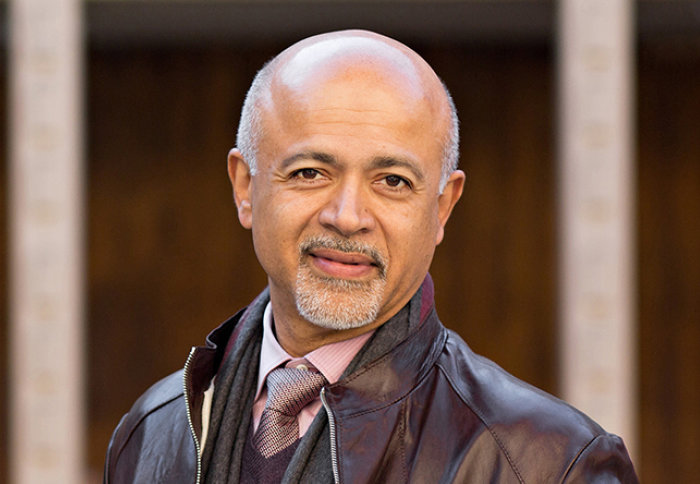Interview: Abraham Verghese on transforming medical education

One of the world’s leading physicians says drastic changes are needed in medical education to keep up with transformation in other areas of medicine.
Professor Abraham Verghese will give one of the key-note talks at the upcoming Transform MedEd conference, held at Imperial next year in partnership with LKCMedicine.
Transform MedEd is a conference series that provides a platform on which global educational challenges can be discussed within the context of trying to find solutions.
This year it focuses on evidence-based education, how humanities and social sciences and the use technology impact medical education, as well as how partners drive transformation.
Register for the Transform MedEd 2020 conference (13-14 March 2020).
Professor Verghese is Stanford University Professor of Medicine and an internationally best-selling author and recipient of multiple accolades including The Heinz Award in Humanities and the National Humanities Medal.
We spoke to Professor Verghese about his thoughts on medical education and the importance of the ‘human touch’ in doctor-patient relationships:
What transformation in medical education would you like to see?

"Very clearly medicine has been transformed in the last few decades, in fields such as genomics for example, so it is not surprising that medical education should also be transformed. I think medical education is perhaps being more gradually transformed than research and practice.
"We tend to stick to things we are doing certain ways and though we have made a lot of changes, but perhaps even more drastic changes are needed.
"There are some timeless principles in medicine – as much as it is about medicine and the disease, it’s always about the human being, an individual person at a particular point in their life.
"Wedding technology and that timeless need to connect with the patient, and the human nature of the enterprise we’re in, that’s what transformation encompasses."
What do you think are the biggest global challenges facing medicine, and how best can medical professionals make local impact?

"It has become very clear that medicine is a global enterprise.
"You can have your borders and boundaries, but with the nature of air travel and climate change it’s become harder to just think locally when you’re being affected by global changes.
"There are some universal principles in the way we educate people in healthcare just as there is something universal about the calling to medicine.
"This is a job where you are taking deep-rooted responsibility for a patient and bringing the best aspects of your humanity to ease their journey.
"And there are universal challenges to us in medical education. One of the biggest challenges is the ubiquity of smartphones and screens taking us away from being truly present with the other."
What themes do you intend to cover during your keynote?
"I intend to speak about the nature of the patient-physician relationship and how at times in our haste to teach medicine students the science and technical aspects we struggle with how to convey the deeply personal nature of medical enterprise.
"It can be hard for students to appreciate without maturity and years of experience the true meaning of the fiduciary responsibility to another human being, but we must teach it and reiterate it and one day it will make sense."
How much should technology play a part in patient care?
"Technology has always played a part. There was an outcry when the stethoscope came along, and we thought it would distance us from the patient. It is now approaching its 200-year anniversary.
"Every tool has helped us become better at what we do, and that’s wonderful, but it still requires an experienced clinician to take that information and translate it into what that means in the trajectory of the patient’s life at that moment.
"There is a danger AI and algorithms can mindlessly amplify some of our biases and prejudices.
"In medicine for example, if your data is not diverse your algorithms are blind to diversity. At one-point Apple was creating a health app for their phone, which tracked various health measurements but it had no means to track women’s menstrual cycles, because it was designed by predominantly male engineers.
"One of the challenges we face in the next decade is to put in technical guidelines to anticipate problems of technology and put cautions and breaks in.
"We learned that the hard way in America with electronical medical records. Highly skilled medical professionals are spending twice as much time on medical records as they are with patients."
LKCMedicine is training doctors to know how and when to use the latest technology, while keeping the patient at the heart of their care. Is this an approach you would agree with?

"I would very much agree with this approach –these are pioneering education changes we need to explore – and am intrigued by the partnership."
How will this conference help educators and clinicians make an impact?
"I would like to think that bringing together educators from all over the world to network, interact with each other and share ideas, will enable them to take that knowledge back to their institutions and countries, and make a bigger impact.
"Hopefully they can use something they learn to change their local experience and change their medical school. Travel broadens the mind, they say, and that aphorism should be true of what it does for educators’ ideas."
Transform MedEd 2020

In March next year, Imperial will host the Transform MedEd 2020 conference - jointly organised with LKCMedicine. The first conference in 2018 attracted 400 delegates from around the world. This year’s conference will address global challenges to achieve local impact.
REGISTER FOR THE CONFERENCE
Article text (excluding photos or graphics) © Imperial College London.
Photos and graphics subject to third party copyright used with permission or © Imperial College London.
Reporter
Stephen Johns
Communications Division